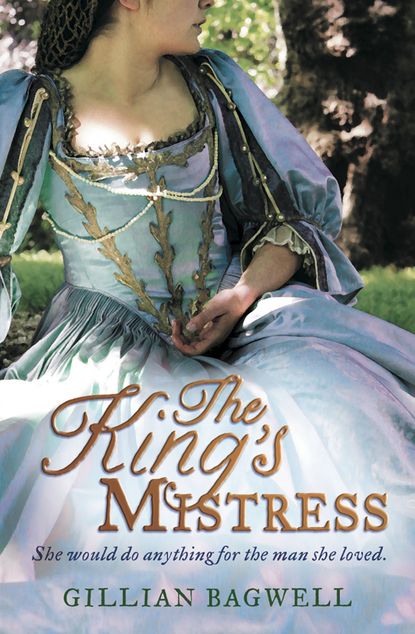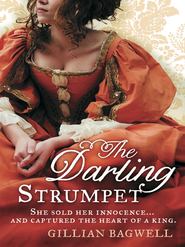По всем вопросам обращайтесь на: info@litportal.ru
(©) 2003-2025.
✖
The King’s Mistress
Настройки чтения
Размер шрифта
Высота строк
Поля
CHAPTER FIVE (#ulink_d0d9d198-5bf7-5de3-bf83-fb8fd5d8c475)
THE WAY TO ABBOTS LEIGH LAY THROUGH BRISTOL. THIS WAS THE most dangerous part of the journey yet, as Charles had spent some months there during the war and might be recognised, though he had aged from the sixteen-year-old boy who had left to the man he was today. Still, it was risky. Henry rode ahead, and Jane could see his shoulders tighten with tension as the increased traffic on the road told them they must be close to the city. His hand strayed to feel for the pistol at his belt, and he eyed passing strangers warily, as though a bent old woman with a flock of geese might be hiding a Parliamentary trooper beneath her skirts.
At length the towering city walls with their arched gates rose ahead.
“Lawford’s Gate,” Charles said over his shoulder to Jane. “The last time I was here the mayor met me with a crowd of dignitaries to welcome me.”
“Better we find our own way today,” Jane said.
Charles pulled his hat lower over his brow as they followed Henry through the massive portal and into the open marketplace, with a castle beyond. The streets were bustling with people on foot and on horseback, with wagons and carts, and with sheep and cattle. Wolverhampton was the biggest town Jane had ever been in, and this was far bigger, she realised with excitement.
“Is London like this?” she asked in Charles’s ear.
“London?” he laughed. “No, this is nothing to London. It’s a good city, though; I liked it here and was sorry to leave. Do you know, I have a month’s mind to see what progress was made on the fortifications since then.” He spurred the horse forward to ride up next to Henry.
“We’ve plenty of daylight left to reach Abbots Leigh,” he said in a low voice. “Let’s ride to St Michael’s Hill to see what became of our works after Oliver took the city.”
Henry glanced around them. People everywhere, including many soldiers. Jane could see him forming his words carefully.
“Is it wise? The sooner you are safely out of the city the better.”
“But half an hour,” Charles said cheerfully. “Humour me. Come, I cannot tell when I may chance to be in Bristol again.”
Before Henry could answer, Charles rode ahead and set off on a street branching away from the marketplace. He seemed infused with a new vigour and excitement, his head held higher, his back straighter. Despite his plain clothes, he looked like a king, Jane thought with both pride and alarm as she wrapped her arms tighter around him.
“The Royal Fort.” Charles pointed as the walls to the northwest of the city came into view. “We rebuilt that when we took the city in ’44, and did much else to strengthen the line of the defences.”
Henry rode beside them, his professional interest as a soldier overcoming his caution, and Charles carried on his commentary in a low voice. It was a beautiful day, a fresh breeze blowing off the water, feathery clouds scudding above, the river full of shipping, the quays swarming with sailors and with dockworkers loading and unloading the ships that rode at anchor.
“My lodgings were just there,” Charles said, pointing out a tall house that rose on a hillside. “And look, there’s the fish peddler my cook used to buy from.”
“Then perhaps we had better ride further from him,” Jane murmured.
“You’re right. And probably time that we made for Abbots Leigh anyway.”
“High time,” Jane heard Henry mutter.
Charles wheeled his horse away from the fort. The hilly streets wound up and down, and just as it seemed to Jane as if they must be heading back the way they had come, Charles reined in and came to a halt. Henry rode up next to him with an inquiring glance.
“Hmm,” Charles said. “I was sure this was the right road.” He glanced behind them and then ahead. “But it doesn’t look at all familiar now. Of course the city has changed …”
Passersby were noting them and Jane felt very conspicuous. She glanced anxiously at Henry and saw that his jaw was tight and his face reddening.
“Let me see now,” Charles muttered. “There’s the sun, so that’s west. We want to go west and north, more or less, once we cross the river, but surely we must go further south first. No, I must have missed a turning.”
He rode confidently back the way they had come and turned into another street about halfway down the hill, and then into another. But they seemed no nearer the river, and Jane could feel Henry’s increasing agitation. A few minutes longer and she was truly worried. The map had shown the general route to Abbots Leigh, but she had no idea how long it would take them to reach it, and the sun was dropping low over the horizon.
“Perhaps we should ask someone,” she ventured, but she wasn’t sure it was the wisest course. As urgent as it was to find their way, any interaction with strangers could bring calamity upon them. Suppose they had the ill luck to speak to someone who recognised the king’s face? The thousand-pound reward was a mighty inducement to betray him, and if they were lost they would have no hope of escaping if they were pursued. She glanced around to see what passersby looked least threatening, and was alarmed to see a small party of soldiers emerging from a tavern a little way ahead, their voices ringing out with boisterous laughter.
“No, I’m sure this must be right now,” Charles said, spurring the horse into a trot down the hill. The road did bring them to an area more heavily peopled, and Jane thought they must be near the quays now, but once more Charles stopped. An inn stood at one side of the road, and a sturdily built ostler was just unhitching a horse from a cart.
“Good even, brother,” Charles called out, and the man glanced up. No light of recognition showed in his eyes, Jane was relieved to see, as they rode closer.
“Like a fool, I’ve lost my way,” Charles said, his words thick with the accent of Staffordshire. “Would you be good enough to tell me how to find the Redcliffe Gate afore my mistress boxes my ears?”
It didn’t take much acting for Jane to look thoroughly annoyed, and the ostler’s red face creased in a grin.
“Not much used to cities, art thou, then, hayseed?”
“No, truly,” Charles laughed with an embarrassed shrug. “I’ve ne’er seen so many houses and people in my life.”
“Well, look you,” the fellow said, and Jane, Henry, and Charles paid close heed to the directions he gave.
“Thankee, friend,” Charles called with a farewell wave. “And I hope to do you a good turn someday.”
“Not likely, boobee!” the stranger laughed. “But I thank you for the thought.”
Jane was relieved when once again the city walls came within view and a high stone gate loomed before them.
“That’s it,” Charles said. “We’ll cross the river at Rownham Passage. It’s not far now, and we can’t miss it.”
This time he was right. The road sloped down to the muddy banks of the Avon, and a ferry was crossing back from the opposite side. The ferryman nodded at them as they rode aboard and Henry counted out their fares, but he didn’t give Charles a second glance. Jane looked in awe at the magnificent deep gorge between two rocky cliffs, through which the river passed on its long journey from Stratford towards the sea.
“It’s only two or three miles now.” Henry sounded relieved as they reached the far bank of the river. “We could take the main road, but according to the map there’s an old Roman road that goes up through the orchard.”
“Then let us use that,” Charles said. “For in this instance, the only way to go is up, and the more private we can be, the better.”
The main road lay before them, climbing a steep hill, the late-afternoon sun slanting down through the canopy of tall trees that lined the road, but Henry led them off to the right, and they easily found the track that wound up through the apple trees, heavy with their red and gold fruit. Jane inhaled the scent, thinking of the orchard at Bentley.
“Boobee?” Charles mused, turning his head over his shoulder to speak to her. “What did the fellow mean by calling me that?”
“It’s a song,” Jane laughed. “All about a country clodhopper that goes to London.”
“Ah.” Charles grinned. “Then I can congratulate myself that I’ve pulled the wool over the eyes of at least one proud man of Bristol. Still, I don’t relish another evening in the kitchens as I spent at Long Marston. It might be more prudent to contrive some way to keep me apart from the household at Abbots Leigh.”
“True,” Jane said. “We could say that you’re ill and not fit to mix with the other servants.”
“That would serve,” Charles agreed. “And I’ve no doubt I look pale and haggard, what with the miles of riding and walking, and the lack of meat and sleep over the past week.”
They were near the summit of the hill now, and Jane was pleased to think that they were so close to having accomplished what they set out to do—get the king in safety to where he could wait while Lord Wilmot found him safe passage from England—but she felt a pang at the realisation that their arrival meant her time with Charles was growing short. How long would it take Lord Wilmot to arrive and then to find a boat? Would she have another evening with Charles? Two? What heartache it would be to turn for home and ride back to Bentley behind Henry. She tightened her arms around Charles’s waist, and he patted her hand.
“Tired?” he asked. “We must be nearly there now.”
“I am weary of riding, but not of your company.”
His hand brushed hers, and his lips tickled her ear as he spoke, his voice a husky whisper. “I shall not let you part from me just yet, sweetheart.”
The horses seemed to sense that they were near the end of their journey, and they pressed on despite the steepness of the hill. Soon a high stone gateway with a two-storeyed gatehouse rose ahead.






